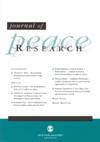Theories of mobilization suggest that groups are more likely to resort to violence in the presence of political opportunity structures that afford greater prospects for extracting concessions from the government or better opportunities to topple ruling governments. However, existing efforts to consider the possible influences of political opportunity structures on incentives for violence and civil war empirically have almost invariably relied upon measures of democracy to proxy for the hypothesized mechanisms, most notably the argument that the opposing effects of political accommodation and repression will give rise to an inverted U-shaped relationship between democracy and the risk of civil war. The authors detail a number of problems with measures of democracy as proxies for political opportunity structures and develop alternative measures based on the likely risks that political leaders will lose power in irregular challenges and their implications for the incentives for resort to violence. The authors evaluate empirically how the security with which leaders hold office influences the prospects of violent civil conflict. The findings indicate that recent irregular leader entry and transitions indeed increase the risk of conflict onset, while democratic institutions are found to decrease the risk of civil war, after controlling for the new measures of state weakness.
Gleditsch, Kristian Skrede & Andrea Ruggeri (2010) Political Opportunity Structures, Democracy, and Civil War, Journal of Peace Research 47 (3): 299–310.









